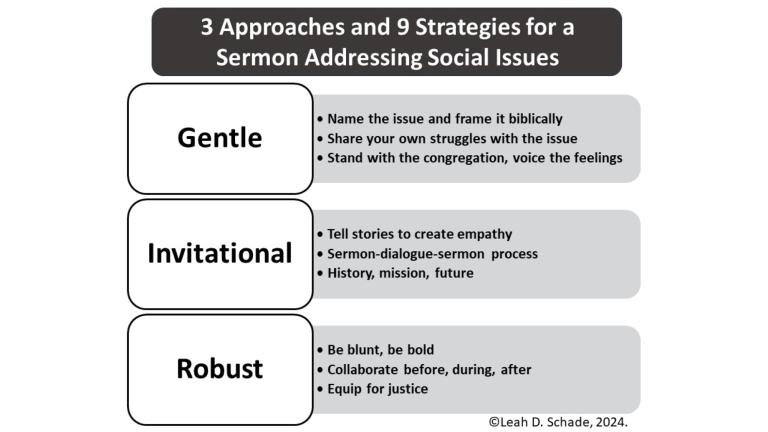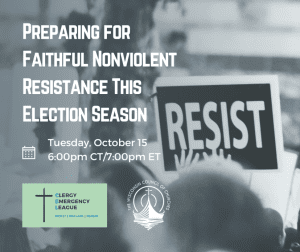John 11:32-44 is the Gospel reading for All Saints Sunday on Nov. 3rd, the Sunday before Election Day. Here are sermon ideas on voting, elections, and All Saints Sunday using Gentle, Invitational, and Robust approaches.

Preaching All Saints Sunday before the election?
[If you’re preaching instead on Mark 12:28-34, see this article: https://www.patheos.com/blogs/ecopreacher/2024/10/love-your-neighbor-vote-sermon-ideas-mark-12-28-34/.]
Before we examine John 11:32-44 and how it might address themes for the Sunday before the election, I want to explain that preachers can address issues related to the election.
Preachers are free to discuss the themes and issues relevant to an election – as long as they refrain from endorsing specific candidates. In fact, many congregants appreciate when their ministers offer biblical, theological, and ethical insight on social issues that impact their lives, families, and communities.
In this article, I explained the do’s and don’ts of what clergy and congregations can say and actions they can take when it comes to politics.
Keep in mind that the biblical writers spoke to the social and political issues of their time because God is concerned with the well-being of all people.
This means that it’s not only permissible for preachers to discuss the election, but it is also their moral and ethical duty to relate the Bible and theology to the issues that are relevant today, particularly as people prepare to exercise their right to vote.
But HOW a preacher talks about the election in their sermon also matters.
I developed an Assessment Tool for preaching and social issues which you can take here. This 5-minute online tool will help you think about your approaches to preaching and social issues using a three-dimensional questionnaire that measures: (1) your own vulnerabilities and strengths, (2) the characteristics of the congregation you serve, and (3) the quality of relationships within the congregation and between the congregation and yourself.
Gentle, Invitational, and Robust Approaches
Based on your score from the Assessment Tool, you’ll see that I suggest three approaches to a sermon addressing a social issue: Gentle, Invitational, and Robust. This is a framework I developed for my book Preaching and Social Issues: Tools and Tactics for Empowering Your Prophetic Voice to help ministers choose which path works best for them and their context.
- The Gentle approach is for clergy who are in situations where there may be personal or congregational stress, the congregation is new to sermons addressing social issues, or there is vulnerability on the part of the preacher.
- The Invitational approach is recommended for congregations that are ready for a more challenging message by way of dialogue and building bridges of listening, empathy, and understanding.
- The Robust approach is for clergy and congregations who are ready to be fully engaged in public theology and to put their faith into action on social issues.
I suggest three strategies for each, for a total of nine in all. You can read about these approaches in more detail in my book. In the meantime, here’s a graphic with a quick summary:

For this installment on preaching during the election season, we’ll look at the Gospel reading for All Saints Sunday, John 11:32-44. I’ll begin with a brief exegetical summary of the passage and suggest connections to election issues. Then I’ll offer Gentle, Invitational, and Robust sermon ideas that you can use in your preaching context.
Nov. 3, 2024: All Saints Sunday: John 11:32-44
Exegetical summary
We’re just getting the tail end of this story in John’s Gospel. This is just a snippet of the larger dialogue. It begins in a few verses earlier with Jesus’s tense exchange with the disciples about whether or not to go to Lazarus (John 11:1-16). Jesus has been threatened with stoning. So, going back to Judea will invite more trouble.
Then just prior to his exchange with Mary, Jesus talks with Martha. It is one of the most pivotal dialogues in the Gospel.
Jesus says to Martha: ‘Your brother will rise again.’ Martha says to him, ‘I know that he will rise again in the resurrection on the last day.’ Jesus responds, ‘I am the resurrection and the life. Those who believe in me, even though they die, will live, and everyone who lives and believes in me will never die. Do you believe this?’ And in a profound declaration of faith – even in the midst of her deepest grief, she says: ‘Yes, Lord, I believe that you are the Messiah, the Son of God, the one coming into the world.’ (John 11:17-27)
Jesus then encounters Mary and is moved to tears. Yes, Jesus cries. He knows what’s at stake. It’s a matter of life and death: Lazarus’ death, Jesus’ life, and the life of the community in the face of immense religious and political forces.
But Jesus does not back down from this. He brings his whole self to Bethany, to his relationships, to his ministry. His emotions are real and raw because his relationships are authentic and deeply personal.

Connections to election issues
On this All Saints Sunday, we too, are in the midst of a heated conversation about who we will be as people of God in the face of immense religious and political forces.
There is a great deal of debate about the role of the church in this tense political time. Like some of the disciples, there are those who say: stay away from Bethany. The church should stay out of these issues of public concern. Others, like Thomas, say: let’s go with Jesus. Let’s put legs to that faith and follow him.
It follows, then, that a sermon on this Sunday can explore what kind of church we shall be, knowing what the Bible models for us, and knowing what challenges our community is facing.
Gentle approach: Share your own struggles with the issue.
In this sermon approach, the preacher could share what they are wrestling with during this election season. When we follow Jesus, we know that our hearts will break, too. What is breaking our heart the way Mary’s and Martha’s and Jesus’ hearts were broken? The preacher could share what is breaking their heart as our nation heads toward Election Day.
Perhaps it is hateful rhetoric that is inciting violence toward vulnerable people. Perhaps it is the ongoing epidemic of gun violence where people are murdered doing some of the most peaceful things a human being can do – going to concerts, community festivals, worship, and school.
So, the preacher can ask: how are we bringing our whole selves to these issues, just as Jesus did?

As in the gospel story, it’s a matter of life and death. Gun violence. Hate crimes. Political violence. All of this means that the life of the community is strained in the face of immense religious and political forces.
[Watch this informative webinar, “Preparing for Faithful Nonviolent Resistance This Election Season,” with Rev. Lauren Grubaugh Thomas, hosted by The Clergy Emergency League and Wisconsin Council of churches.]
Just like the disciples, Martha, Mary and Jesus himself, our emotions are real and raw because our relationships are authentic and deeply personal. We can bring all of that to the polls when we vote, just as we bring our whole selves to worship on this All Saints Sunday.
And we can trust that God is with us in those places, just as Jesus went to Bethany.
Invitational approach: Tell stories to create empathy.
Notice what Jesus is doing in the midst of his dialogues with the disciples, Martha, and Mary. He is stepping into the smell of death hanging like a death shroud over the community. He’s taking risks in order to meet people in their profound loss. And he is raising Lazarus and restoring life – even at great cost. This is the incident that will eventually lead to his arrest and crucifixion.
Make no mistake – going to Bethany and raising Lazarus was a decision with political consequences.
In this sermon, the preacher can share stories about people of faith ministering to those who have been hurt by the rise of Christian nationalism that is targeting vulnerable people. What congregations are coming alongside trans teens to give them support and courage? What churches are advocating for immigrants and refugees? Who are the religious leaders that are publicly calling for nonviolent resistance to evil?
With these examples in mind, the preacher can pose a question. As Christians, as a community of faith, what is our “best self” that could emerge during this difficult time? Do we have the courage to go to Bethany and face what needs to be faced? Can we have the tough conversations, just as Jesus did?
On this All Saints Sunday just two days before the election, this prophetic courage is part of what it means to be one of the Saints of God.
Robust approach: Equip for justice.
For this sermon, the preacher can pose the question: What is the story of Jesus raising Lazarus teaching us about what it means to be the church in the midst of contentious public issues?
Jesus is coming to us – coming to the church – coming to us as his followers, just as he came to Bethany. He is inviting us to engage these issues of life and death.
So, what are next steps we might take based on what this biblical passage models for us? Are we sensing God’s invitation to engage public concerns? Is God urging us to Bethany to engage with a specific justice issue?
The preacher can offer a session with a local community organizer to help the congregation get trained to address the needs of this community. Many already know what has Lazarus bound and trapped in the tomb. So the session can be about how the ministry of this church can be part of Jesus’ ministry.

Bottom line – people of faith must overwhelm the ballot box with goodness, solidarity, and love.
The story of the raising of Lazarus shows us that like Jesus, we need to bring our whole selves to Bethany. This means bringing our intellect, our emotions, our actions, and, yes, our faith and values to the ballot box on Election Day.
No matter the outcome of the midterm elections, the work still remains. Lazarus is still in the tomb waiting to be unbound.
It’s time to make our way to Bethany with Jesus, to stand alongside the disciples, Martha, Mary, and all the saints of God, the “great cloud of witnesses,” to engage with Jesus on these issues of life and death. It’s time to bring our whole selves to this democracy, to this country, to this public discourse about what kind of people we will be.
Jesus brought it all when he came to Bethany.
Are you ready to bring it all?
Are you ready to join with Thomas and go to Bethany? To bring your whole self? To bring your faith and values to the ballot box? Are you ready to unbind Lazarus?
Because here’s what you need to remember: Jesus has already completed the miracle! Our task is only to unbind him, unbind her, unbind our siblings wrapped in the shroud of death. Our only task is to follow Jesus’ command: Unbind them and let them go!
May God bless your discernment, dialogue, preaching, and ministry during this election season!
Stay tuned for sermon helps for the post-election season!
Read also:
Love Your Neighbor: Vote! Sermon Ideas, Mark 12:28-34
What Clergy Can Say (and Not Say) During the Election Season
Fill Your Lamps, Church – Let’s Be Ready! Post-election Sermon
Ideas for Clergy Dealing with Pre-Election Stress

The Rev. Dr. Leah D. Schade is the Associate Professor of Preaching and Worship at Lexington Theological Seminary in Kentucky and ordained in the ELCA. Dr. Schade does not speak for LTS or the ELCA; her opinions are her own. She is the author of Preaching and Social Issues: Tools and Tactics for Empowering Your Prophetic Voice (Rowman & Littlefield, 2024), Preaching in the Purple Zone: Ministry in the Red-Blue Divide (Rowman & Littlefield, 2019) and Creation-Crisis Preaching: Ecology, Theology, and the Pulpit (Chalice Press, 2015). She is the co-editor of Rooted and Rising: Voices of Courage in a Time of Climate Crisis (Rowman & Littlefield, 2019). Her book, Introduction to Preaching: Scripture, Theology, and Sermon Preparation, was co-authored with Jerry L. Sumney and Emily Askew (Rowman & Littlefield, 2023).













